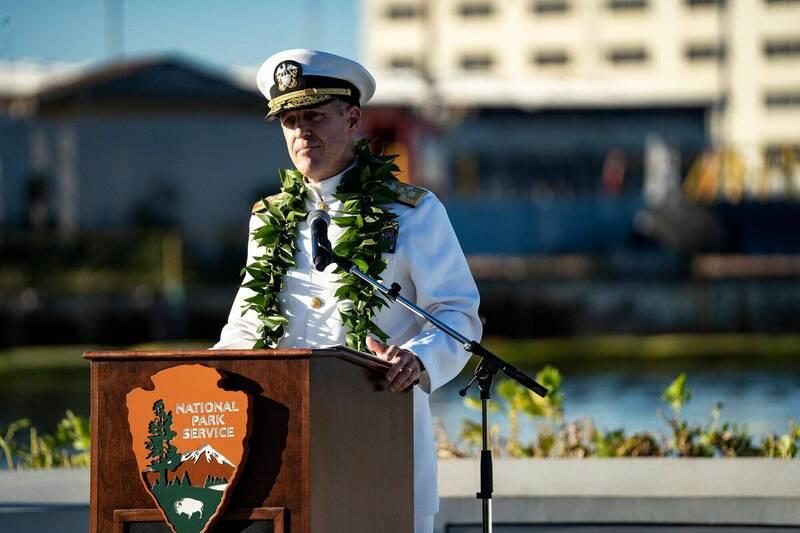Admiral Stephen Koehler, commander of the US Pacific Fleet, on Tuesday said that the fleet’s mission to deter aggression in the South China Sea encompasses Taiwan.
Koehler was speaking at the 15th annual Center for Strategic and International Studies’ South China Sea Conference in Hawaii on Tuesday.
Seeking hegemony in the region, China has “increased its deployments and aggressive tactics in the South China Sea,” and “intensified its rehearsals for invasion and blockade of Taiwan,” he said.

Photo: AP
The US Pacific Fleet’s “mission is to deter aggression across the Western Pacific, together with our allies and partners, and to prevail in combat if necessary,” Koehler said.
“That mission of deterrence applies region-wide — including the South China Sea and Taiwan,” he said. “A conflict or crisis in either place would threaten the interests of countries across the region.”
There are two Pacific Fleet carrier strike groups operating in the region: the USS Nimitz, which has been operating in and around the South China Sea for the past few months, and the USS George Washington, which is based in Japan and has been patrolling the Western Pacific, Koehler said.
The USS Tripoli amphibious assault ship is heading to its new base in Sasebo, Japan, and the USS America Amphibious Readiness Group is in Australia for the biannual Talisman Sabre exercise, he added.
In the coming year, China can be expected “to continue to try to divide and pressure Southeast Asian countries over the South China Sea,” he said.
Tetsuo Kotani, a senior fellow at the Japan Institute of International Affairs, said that Japan is promoting the concept of a “single theater,” viewing the four major conflict points in East Asia as one major challenge to encourage allied nations to respond together.
Without Taiwan’s participation, Indo-Pacific countries would not be able to guarantee peace and stability in the Taiwan Strait or the East and South China Seas, Kotani said.
Due to Beijing's so-called “one China” principle, it is challenging for countries to engage in military cooperation with Taiwan, he said.
Kotani invited Taiwan to observe joint military drills, such as the Balikatan and Rim of the Pacific exercises, so that other countries’ militaries have more opportunities to interact with the nation.

The manufacture of the remaining 28 M1A2T Abrams tanks Taiwan purchased from the US has recently been completed, and they are expected to be delivered within the next one to two months, a source said yesterday. The Ministry of National Defense is arranging cargo ships to transport the tanks to Taiwan as soon as possible, said the source, who is familiar with the matter. The estimated arrival time ranges from late this month to early next month, the source said. The 28 Abrams tanks make up the third and final batch of a total of 108 tanks, valued at about NT$40.5 billion

Two Taiwanese prosecutors were questioned by Chinese security personnel at their hotel during a trip to China’s Henan Province this month, the Mainland Affairs Council (MAC) said yesterday. The officers had personal information on the prosecutors, including “when they were assigned to their posts, their work locations and job titles,” MAC Deputy Minister and spokesman Liang Wen-chieh (梁文傑) said. On top of asking about their agencies and positions, the officers also questioned the prosecutors about the Cross-Strait Joint Crime-Fighting and Judicial Mutual Assistance Agreement, a pact that serves as the framework for Taiwan-China cooperation on combating crime and providing judicial assistance, Liang

A group from the Taiwanese Designers in Australia association yesterday represented Taiwan at the Midsumma Pride March in Melbourne. The march, held in the St. Kilda suburb, is the city’s largest LGBTQIA+ parade and the flagship event of the annual Midsumma Festival. It attracted more than 45,000 spectators who supported the 400 groups and 10,000 marchers that participated this year, the association said. Taiwanese Designers said they organized a team to march for Taiwan this year, joining politicians, government agencies, professionals and community organizations in showing support for LGBTQIA+ people and diverse communities. As the first country in Asia to legalize same-sex

MOTIVES QUESTIONED The PLA considers Xi’s policies toward Taiwan to be driven by personal considerations rather than military assessment, the Epoch Times reports Chinese President Xi Jinping’s (習近平) latest purge of the Chinese People’s Liberation Army (PLA) leadership might have been prompted by the military’s opposition to plans of invading Taiwan, the Epoch Times said. The Chinese military opposes waging war against Taiwan by a large consensus, putting it at odds with Xi’s vision, the Falun Gong-affiliated daily said in a report on Thursday, citing anonymous sources with insight into the PLA’s inner workings. The opposition is not the opinion of a few generals, but a widely shared view among the PLA cadre, the Epoch Times cited them as saying. “Chinese forces know full well that